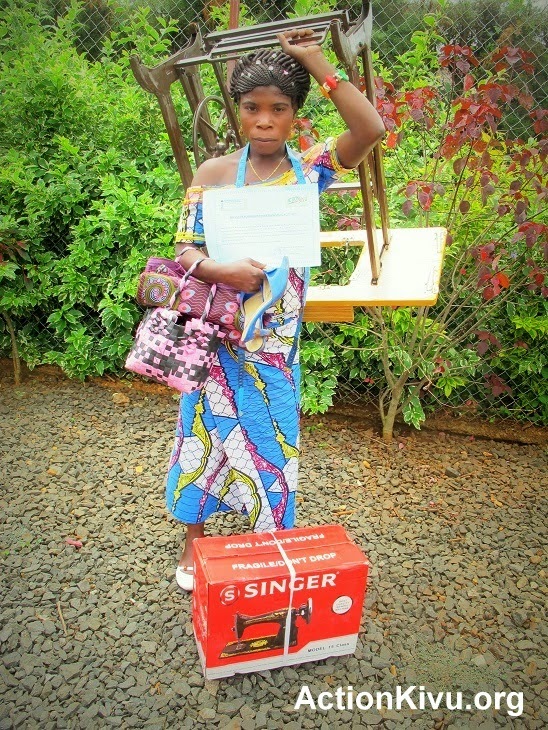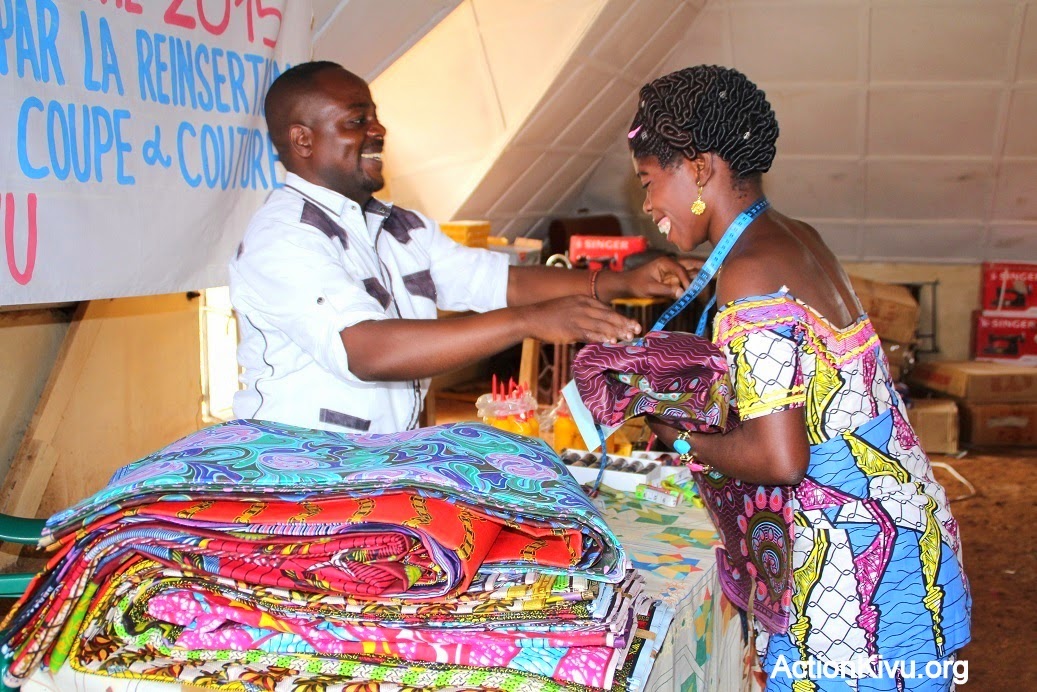“If there are people who think nothing can bring back their lost hope, they should come talk to me.” ~ Cikwanine, Secondary Student, Mother, Future Lawyer.
The three girls squint into the sun, posing for the camera in front of the Mumosho Women’s Center, their home for over a year. Wearing white shirts and blue skirts, the uniform of the Congo student, they hold hands and radiate confidence in their smiles and posture, a hip jutted out here, shoulders thrown back there. Looking at these three girls, you’d never guess their stories of sexual assault, unplanned pregnancies, and being abandoned by their families, but you believe they’ll pursue their dreams.Nadine is an 18-year-old student and mother, part of the Teen Mothers Program Action Kivu’s partner ABFEK runs at the Women’s Center. With unplanned, unwanted pregnancies from rape forced upon so many girls and women in eastern Congo, they are often kicked out of their homes, abandoned with a baby on the way. Nadine had already lost both parents to HIV / AIDS when she was just 13, and was forced to drop out of school. Her elderly grandparents took her in, but already lived in poverty, with no source of income to send her back to school. Nadine found work on other people’s farms to earn a dollar to help buy food.
Nadine holds hands with Chanceline, her new friend and now adopted sister at the Women’s Center. Chanceline is also 18, and before moving into the Teen Mother housing, she was homeless, abandoned by her family after her sexual assault and resulting pregnancy. After learning about the Teen Mothers Program from a former classmate, she found her new home there, first learning to weave and sell baskets in one of the vocational training courses, then deciding to return to school.
Having just finished Grade 3 of secondary school, Chanceline is excited to start Grade 4 in the fall. Living at the center with the other girls, she is learning new skills with the women in the various vocational trainings, classes that give structure to her life. “Before [joining the Teen Mothers Program] my head and heart were always in the air, with no plans,” she says. “I was only thinking about being hated, but now I know that there are people who care about me, I feel I am not alone!” Chanceline hopes to continue her education after she graduates secondary school: “Going to university will help me have the chance to access jobs, create change in my life, and help me care for others.'' Cikwanine stands a head taller than her friends. At 20 years old, she had been out of school for five years after giving birth to her child. “I spent five years out of school as an unwanted pregnancy was forced on me,” she says. “I had no hope and was thinking that was the end of my life.”A woman who is a member of ABFEK’s microloan program told Cikwanine about ABFEK’s vocational trainings for girls of her age. The next morning, Cikwanine visited the Mumosho Women’s Center, where she was greeted warmly, and was instantly interested in the Sewing Program. Moving into the Teen Mothers’ housing in the center, she finished the sewing training, and decided it was time to go back to school.
The Educational Assistance Program, sponsored by Jewish World Watch, has transformed Cikwanine’s life. “If there are people who think nothing can bring back their lost hope,” she says, “they should come talk to me and I will tell them how first of all the sewing program brought me back some hope, but the Educational Assistance Program is a recovery for me. I know my life has changed. My thoughts have changed, my feelings have changed, I have recovered. I am so happy, I have become a new person.”Cikwanine’s plan for this new life? “My goal is to go to university and become a lawyer to be able to stand for and with the people who have no voice!”Graduating from secondary school will give Nadine the opportunity to work as a primary school teacher, but she too plans to continue her formal education. Having lost her parents to HIV/AIDS, she hopes to study medicine, but also dreams of becoming a lawyer, to defend the rights of the oppressed and create change in Congo. “I thank everyone, and especially Jewish World Watch for supporting my education,” she tells Action Kivu’s partner and leader, Amani Matabaro. “Without you, I had no other hope, and now I have new hope for the future! Being at the center has changed and transformed my life, it is a new experience living with people who show me love and compassion.”__________Your support makes a difference. Consider a donation to ensure the continued success of all of Action Kivu's programs, and follow Action Kivu on Facebook, Twitter, Instagram, and our blog for updates and stories from Congo: the women in our Vocational & Entrepreneurial Trainings including our Sewing Workshop, Literacy Courses, the kids and women in the Educational Assistance Program, our community empowerment meetings, photos of goats and chickens from our Animal Husbandry programs, and stories from the shared teaching farms! Meet our leader in Congo through this powerful video: "I am Congo: Amani, the Community Builder."




